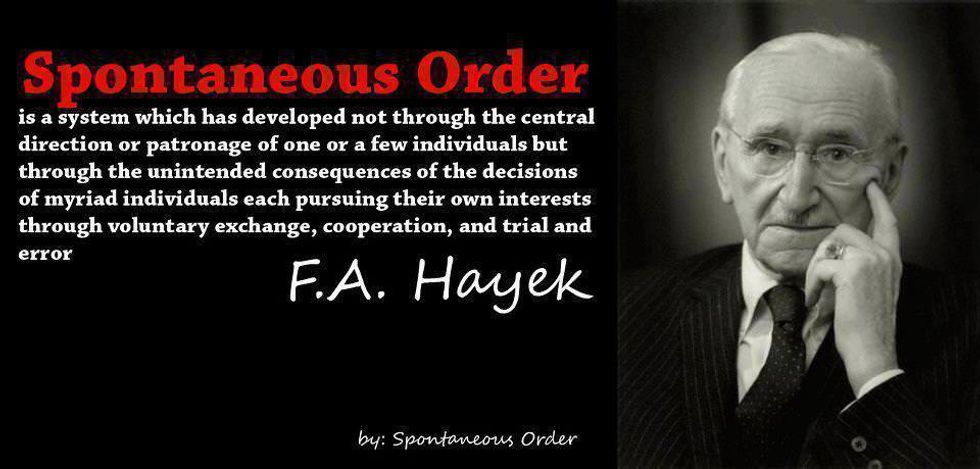Human beings coexist with two types of order according to late economist F.A. Hayek, in his works Law, Liberty, and Legislation. The first state of cohesion he describes as "grown" and the other as "made". He refers to these two types by their Greek names kosmos and taxis. Grown is the the concept of spontaneous which can be described as a cohesive and functional organism which operates toward a purpose and arrives at rules that demonstrate continuity over time. Hayek presents a beautiful description of this Kosmos society, where expectations match intentions thus producing a system of order. Where he defines order as a system of multiplicitous dimensions in which every dimension or variable has an expectation that proves correct in it's outcome. At this point it becomes imperative that one recognizes that each facet of this organism or organization must retain its sense of order and continuity so as to achieve a purpose. However, sometimes there are circumstances in which the natural order of human existence can be manipulated by an external force or a central planning committee of sorts. This being the case, when an exogenous force intervenes and attempts to muddle this natural order in a unique way that is unfamiliar to this coalition of individuals or variables that has already established a continuous system of order, often consequences begin to arise, and the initial intent of the external party is unsuccessful. Spontaneous order is the natural and efficient way in which a coalition of individuals who possess the most amount of knowledge regarding their environment establish social order and function amongst one another.
In an effort to exemplify this concept within a society one could consider the example of the sharing economy. And to an even narrower degree consider companies such as Uber and Lyft. These are two organizations that discovered a way for individuals to reallocate the use of their owned goods in more profitable ways rather than letting their vehicles sit idly in the garage. This is the best example of spontaneous order, where an entrepreneur saw a need in the community, not only for riders but also for drivers. This concept of spontaneous order, or grown order, can be seen in any first world country with relatively low market barriers to entry. However, often other preexisting competitors within that industry will become upset and lobby for regulations from their legislature and have their competitors constricted. This is the scenario where the exogenous entity enters a preexisting sense of order, a market ecosystem if you will, and disturbs this order through regulatory applications. Often once this order is disturbed the negative outcomes are labeled market failures. Hayek brings some very interesting concepts into play when considering this idea of spontaneous order in all its efficiency, and the effects of an upset caused by external parties who possess very little information about the entity they are attempting to control.







































